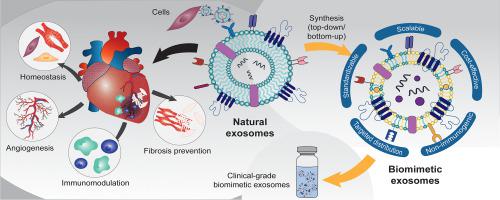Nanomedicine: Nanotechnology, Biology and Medicine ( IF 4.2 ) Pub Date : 2021-03-24 , DOI: 10.1016/j.nano.2021.102385 Ramiro A Villarreal-Leal 1 , John P Cooke 2 , Bruna Corradetti 3

|
Inflammation is a central mechanism in cardiovascular diseases (CVD), where sustained oxidative stress and immune responses contribute to cardiac remodeling and impairment. Exosomes are extracellular vesicles released by cells to communicate with their surroundings and to modulate the tissue microenvironment. Recent evidence indicates their potential as cell-free immunomodulatory therapeutics for CVD, preventing cell death and fibrosis while inducing wound healing and angiogenesis. Biomimetic exosomes are semi-synthetic particles engineered using essential moieties present in natural exosomes (lipids, RNA, proteins) to reproduce their therapeutic effects while improving on scalability and standardization due to the ample range of moieties available to produce them. In this review, we provide an up-to-date description of the use of exosomes for CVD and offer our vision on the areas of opportunity for the development of biomimetic strategies. We also discuss the current limitations to overcome in the process towards their translation into clinic.
中文翻译:

仿生和免疫调节疗法作为血管和心脏应用中天然外泌体的替代品
炎症是心血管疾病(CVD)的核心机制,持续的氧化应激和免疫反应会导致心脏重塑和损伤。外泌体是细胞释放的细胞外囊泡,用于与周围环境进行通讯并调节组织微环境。最近的证据表明它们作为 CVD 的无细胞免疫调节疗法的潜力,可以防止细胞死亡和纤维化,同时诱导伤口愈合和血管生成。仿生外泌体是使用天然外泌体中存在的必需部分(脂质、RNA、蛋白质)设计的半合成颗粒,可重现其治疗效果,同时由于可用于生产它们的部分范围广泛,因此提高了可扩展性和标准化。在这篇综述中,我们提供了外泌体在 CVD 中的应用的最新描述,并提出了我们对仿生策略发展机会领域的愿景。我们还讨论了目前在将其转化为临床的过程中需要克服的局限性。











































 京公网安备 11010802027423号
京公网安备 11010802027423号